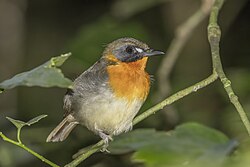Biology:Forest robin
| Forest robin | |
|---|---|

| |
| Ankasa Forest Reserve, Ghana | |
| Scientific classification | |
| Domain: | Eukaryota |
| Kingdom: | Animalia |
| Phylum: | Chordata |
| Class: | Aves |
| Order: | Passeriformes |
| Family: | Muscicapidae |
| Genus: | Stiphrornis Hartlaub, 1855 |
| Species: | S. erythrothorax
|
| Binomial name | |
| Stiphrornis erythrothorax Hartlaub, 1855
| |
The forest robin or orange-breasted forest robin (Stiphrornis erythrothorax) is a species of bird from Central and West Africa. It is monotypic in the genus Stiphrornis. It has been placed in the family Turdidae, but is now generally placed in Muscicapidae in the group popularly known as chats. Most taxonomists consider it a single species, but some reviews have recommended recognizing 5 species. It has a total length of around 12 cm (4 3⁄4 in), has dark upperparts, and a throat and chest that, depending on the subspecies, is yellow-orange or deep orange.[2]
Description
It has a total length of around 12 cm (4 3⁄4 in), has dark upperparts, and a throat and chest that, depending on the exact subspecies, is yellow-orange or deep orange.[2]
Taxonomy
The initial split into multiple species within this genus is based on a review from 1999 where it, based on the phylogenetic species concept, was argued that all then recognized taxa should be considered monotypic species.[3] Of these, S. gabonensis and S. xanthogaster were formerly considered subspecies of S. erythrothorax, whereas S. sanghensis was described as an entirely new species.[3] The split was not followed in Handbook of the Birds of the World, where it was described as "perhaps premature".[2] Comparably, the BirdLife Taxonomic Working Group (and consequently IUCN) recommended not following the split, as differences in plumages are relatively small, genetic sampling considered incomplete, and evidence for intergradation or parapatry is lacking.[1] Another species from this complex, S. pyrrholaemus, was described as a new species in 2008. Based on mtDNA, it is placed within S. erythrothorax sensu lato, and consequently is only a species (rather than a subspecies of S. erythrothorax) if at least some of the taxonomy recommended in 1999 is followed.[4] The genetic divergence between S. pyrrholaemus and other members of the genus is comparable to that between some other closely related species.[4]
Three additional taxa in the forest robin complex were described (as species) in 2016: Stiphrornis (erythrothorax) dahomeyensis (Dahomey forest robin), S. (e.) inexpectatus (Ghana forest robin), and S. (e.) rudderi (Rudder's forest robin). These three taxa are nested within S. erythrothorax sensu lato; however, using the phylogenetic species concept, the study recommended the treatment of all eight forest robin taxa as distinct species.[5]
Clements recognizes three species. the olive-backed forest robin, Stiphrornis pyrrholaemus, the orange-breasted forest robin, Stiphrornis erythrothorax, and the yellow-breasted forest robin, Stiphrornis mabirae.
Subspecies
The currently-recognized taxa in the forest robin complex are:[6]
- Olive-backed forest robin Stiphrornis erythrothorax pyrrholaemus Schmidt & Angehr, 2008
- Western forest robin Stiphrornis erythrothorax erythrothorax Hartlaub, 1855
- Gabon forest robin Stiphrornis erythrothorax gabonensis Sharpe, 1883
- Dahomey forest robin Stiphrornis erythrothorax dahomeyensis Voelker et al., 2016
- Ghana forest robin Stiphrornis erythrothorax inexpectatus Voelker et al., 2016
- Eastern forest robin Stiphrornis erythrothorax xanthogaster Sharpe, 1903
- Sangha forest robin Stiphrornis erythrothorax sanghensis Beresford & Cracraft, 1999
- Rudder's forest robin Stiphrornis erythrothorax rudderi Voelker et al., 2016
The relationships among the taxa are as follows:[5]
| |||||||||||||||||||||||||||||||||||||||||||
References
- ↑ 1.0 1.1 BirdLife International (2018). "Stiphrornis erythrothorax". IUCN Red List of Threatened Species 2018: e.T103763077A132191967. doi:10.2305/IUCN.UK.2018-2.RLTS.T103763077A132191967.en. https://www.iucnredlist.org/species/103763077/132191967. Retrieved 11 November 2021.
- ↑ 2.0 2.1 2.2 Collar, N. (2005). Forest Robin (Stiphrornis erythrothorax). Pp. 730-731 in: del Hoyo, J., Elliott, A., & Christie, D. eds. (2005). Handbook of the Birds of the World. Vol. 10. Cuckoo-shrikes to Thrushes. Lynx Edicions, Barcelona. ISBN:84-87334-72-5
- ↑ 3.0 3.1 Beresford, P.; Cracraft, J. (1999). "Speciation in African forest robins (Stiphrornis): species limits, phylogenetic relationships, and molecular biogeography". American Museum Novitates (3270): 1–22. https://research.amnh.org/vz/ornithology/pdfs/1999d.ForestRobin.pdf.
- ↑ 4.0 4.1 Schmidt, B.; Foster, J.; Angehr, G.; Durrant, K.; Fleischer, R. (2008). "A new species of African Forest Robin from Gabon (Passeriformes: Muscicapidae: Stiphrornis)". Zootaxa 1850: 27–42. doi:10.11646/zootaxa.1850.1.2. https://repository.si.edu/bitstream/handle/10088/7476/bks5.pdf?sequence=1&isAllowed=y.
- ↑ 5.0 5.1 Voelker, G.; Tobler, M.; Prestridge, H. L.; Duijm, E.; Groenenberg, D.; Hutchinson, M. R.; Martin, A. D.; Nieman, A. et al. (2016). "Three new species of Stiphrornis (Aves: Muscicapidae) from the Afro-tropics, with a molecular phylogenetic assessment of the genus". Systematics and Biodiversity 15 (2): 87–104. doi:10.1080/14772000.2016.1226978.
- ↑ Gill, F & D Donsker (Eds). 2017. IOC World Bird List (v 7.1). doi:10.14344/IOC.ML.7.1.
Wikidata ☰ Q15198021 entry
 |


